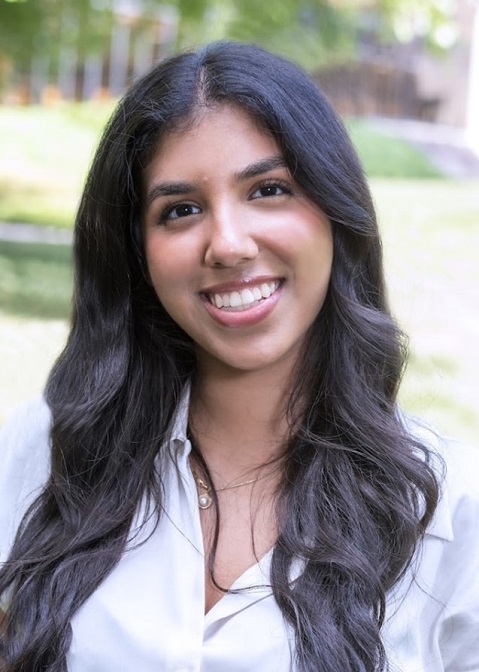
Entering a Whole New World
June 16, 2024
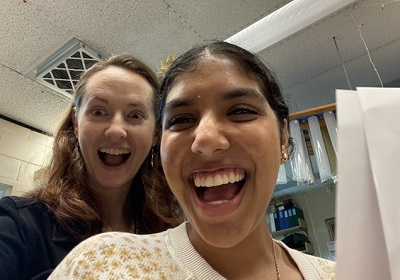 Hi! My name is Khushdeep Kaur and I am a rising sophomore studying Neuroscience on the pre-med track at the University of Delaware. My journey into the world of medicine is a bit anomalous. My parents aren’t doctors, or nurses, none of my family members are. I never had any major medical problems growing up, or experiences that may have paved my path towards healthcare. In fact, I used to love my visits to the pediatrician because I knew I would always end up leaving with either a lollipop or a princess sticker. In a way, I was grateful to be shielded from the reality of medicine.
Hi! My name is Khushdeep Kaur and I am a rising sophomore studying Neuroscience on the pre-med track at the University of Delaware. My journey into the world of medicine is a bit anomalous. My parents aren’t doctors, or nurses, none of my family members are. I never had any major medical problems growing up, or experiences that may have paved my path towards healthcare. In fact, I used to love my visits to the pediatrician because I knew I would always end up leaving with either a lollipop or a princess sticker. In a way, I was grateful to be shielded from the reality of medicine.
Growing up I saw how hard my parents worked, my dad working 18-hour shifts as an immigrant with no education and limited ability to converse in English. My mother made sure my brother and I were taken care of and nourished us with the utmost love. Despite the long days my dad may have had, he always made time to just sit and talk to us about important life lessons. One of the most valuable conversations I remember was about the essence of education. “Somebody could take everything from you, your money or your car, but they can’t take away the knowledge that your brain possesses.” Although he never found interest in school, this sentence resonated heavily and made me realize that the power of knowledge is limitless. Oddly, it was also a steppingstone towards my fascination with the brain.
I never really had a favorite subject in school or a particular hobby, so it made it a bit difficult to decide which career path I needed to be navigated to. All I knew, at the time, was that I really loved school⎯ most importantly the aspect of learning. I looked forward to being introduced to new concepts and topics, especially challenging ones, because the end result always seemed to bring a greater deal of satisfaction. As I explored my interests, I also realized that service was also a significant portion of my life. Whether it be serving underrepresented communities through outreach or helping feed the homeless through my local Gurdawara⎯ bringing a sense of contribution to the world is important to me, even if it may be something miniscule.
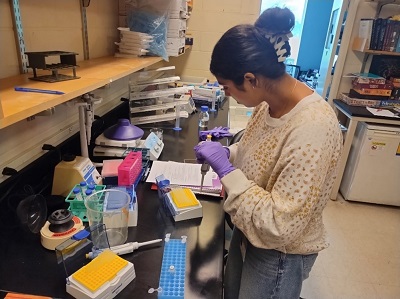 As I expanded my horizons in the healthcare field, I knew I wanted to gain deeper exposure and explore its many facets. Volunteering at a hospital and gaining my CNA license were just some of the clinical components I had partaken in, but I wanted to gain insight into the behind-the-scenes portion⎯ the research. After hearing about it from a previous alumnus, as well as reading about it through an email, I went on one of the discovery days. I enjoyed talking to all the staff and being able to perform some wet experiments with micropipetting DNA, because it allowed me to get a feel for what it could be like to be placed in a similar environment. I wasn’t sure about my chances, but I decided to apply regardless. After seeing my acceptance email, I was excited to find out that I was going to do research for the summer, but at the same time a bit nervous.
As I expanded my horizons in the healthcare field, I knew I wanted to gain deeper exposure and explore its many facets. Volunteering at a hospital and gaining my CNA license were just some of the clinical components I had partaken in, but I wanted to gain insight into the behind-the-scenes portion⎯ the research. After hearing about it from a previous alumnus, as well as reading about it through an email, I went on one of the discovery days. I enjoyed talking to all the staff and being able to perform some wet experiments with micropipetting DNA, because it allowed me to get a feel for what it could be like to be placed in a similar environment. I wasn’t sure about my chances, but I decided to apply regardless. After seeing my acceptance email, I was excited to find out that I was going to do research for the summer, but at the same time a bit nervous.
This frisson feeling stemmed from the idea that this was something absolutely new that I was going to be doing. I was afraid that I was going to have no clue what was happening and the change itself felt a bit overwhelming. Dr. Purdy and Dr. Leystra, however, helped ease the transition. The academically enriching foundations course that we were required to do beforehand followed by “bootcamp week” (which is typically the first week before you start labs) provided insight of what the summer entails. Now, as I currently work with my mentor, Dr. Jason Wasserman under the lab of Dr. James Duncan, I feel at ease because some of the jargon and terminology is not entirely new. My lab focuses on the kinome, and uses proteomics techniques, such as kinome profiling and phosphoproteomics, to investigate the so-called "dark cancer kinome" with the aim of identifying novel therapeutic kinase targets for cancer treatment. At first, all of these concepts felt overwhelming, but I know that I am surrounded by individuals who will graciously provide assistance and answers to all the questions I have.
I look forward to working on my project, and I am eager to learn more about the process of research itself. Although this may be new, I know that this change is good. Change is the process of growth, which is quintessential for day to day living. I am excited to see how my experience goes, and I am elated to join the Fox Chase community!
Every Day is a Learning Process
July 14, 2024
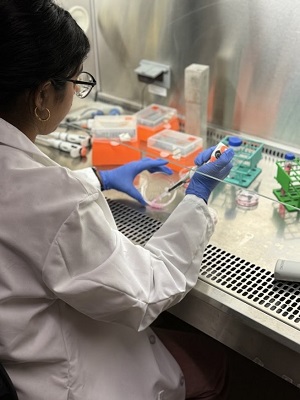 These past few weeks have flown by! I can’t believe that I am already a month in, and it feels so unbelievable. From being anxious about starting this experience to now being adjusted to my lab and project, that same feeling of anxiousness is no longer there. My experience coming into the lab was very different than I had expected. I anticipated having to follow a strict schedule of mini experiments, but I soon realized that science doesn’t adhere to a set schedule and requires constant readjustment.
These past few weeks have flown by! I can’t believe that I am already a month in, and it feels so unbelievable. From being anxious about starting this experience to now being adjusted to my lab and project, that same feeling of anxiousness is no longer there. My experience coming into the lab was very different than I had expected. I anticipated having to follow a strict schedule of mini experiments, but I soon realized that science doesn’t adhere to a set schedule and requires constant readjustment.
My project focuses on a specific kinase, MRCKa, and we plan to determine whether mutations in this kinase contribute to increased oncogenic potential in ovarian and endometrial cancer patients. So far, I have learned so many techniques, such as making acrylamide gels for western blots, preparing buffers, generating mutations, the PCR process, bacterial transformation, tissue culture, and agar plating. I am looking forward to learning so many more skills including how to run western blots, perform kinase purification, and conduct kinase assays to be able to illustrate my results.
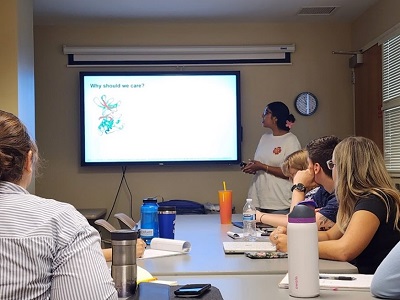 Every day is a learning process. Not every experiment goes as planned. For instance, we have tried to redo one of our experiments three times and still haven’t achieved the results we were hoping for, as our colonies did not grow for a specific primer. In situations like these, it’s essential to take a step back and admit that it can be frustrating. However, it's important to think through what may have gone wrong. Is it a technical error? Did I not add enough of the primer? Do we need to adjust the extension time during the PCR cycles? It is essential to realize that mistakes are bound to happen and to not be afraid to ask for help from highly qualified mentors who are always available to help with endless questions.
Every day is a learning process. Not every experiment goes as planned. For instance, we have tried to redo one of our experiments three times and still haven’t achieved the results we were hoping for, as our colonies did not grow for a specific primer. In situations like these, it’s essential to take a step back and admit that it can be frustrating. However, it's important to think through what may have gone wrong. Is it a technical error? Did I not add enough of the primer? Do we need to adjust the extension time during the PCR cycles? It is essential to realize that mistakes are bound to happen and to not be afraid to ask for help from highly qualified mentors who are always available to help with endless questions.
Outside of the lab, we make an effort to spend time together and build camaraderie. Whether it’s a simple lunch catch-up, a visit to a cute ice cream shop, or exploring new places around town, we prioritize having fun and getting to know each other better. These moments of relaxation and enjoyment help us bond as a team and create a positive, supportive environment. Additionally, it also gives each other the opportunity to hear about what everyone else is doing in their labs. I believe it is crucial to build these connections and ensure that our time isn’t solely dedicated to work. Balancing work with enjoyable activities is essential for our mental health and overall well-being.
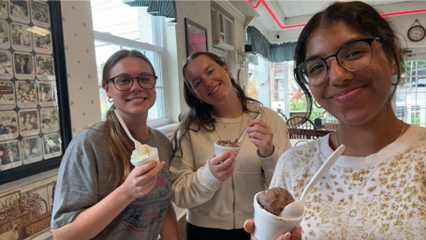 Reflecting on these experiences, I realize that the unpredictability and the need for constant problem-solving are what make this journey both challenging and rewarding. Each setback is an opportunity to learn and improve, and each success is a testament to perseverance and teamwork. As I continue with my research, I am excited to delve deeper into the mysteries of MRCKa and contribute to our understanding of its role in cancer, and most importantly being able to share this knowledge with others.
Reflecting on these experiences, I realize that the unpredictability and the need for constant problem-solving are what make this journey both challenging and rewarding. Each setback is an opportunity to learn and improve, and each success is a testament to perseverance and teamwork. As I continue with my research, I am excited to delve deeper into the mysteries of MRCKa and contribute to our understanding of its role in cancer, and most importantly being able to share this knowledge with others.
Final Moments
August 29, 2024
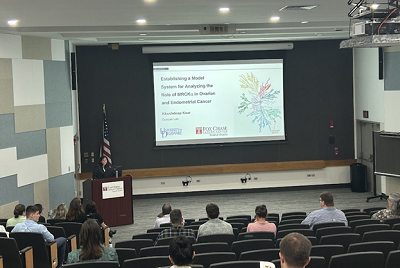 As my time at Fox Chase wraps up, I can't help but look back on those marathon days and endless overtime hours with a mix of exhaustion and pride. There were definitely moments when I wondered if it was all worth it, but in the end, the experience turned out to be incredibly rewarding and packed with valuable lessons. My project began with a focus on mutations in the CDC42BPA gene, which encodes MRCKa, and whether these mutations made the kinase more oncogenic in ovarian and endometrial cancer. But then I hit an obstacle in the road: our manufacturer sent a C-terminal plasmid instead of the N-terminal one. It might sound like a tiny mix-up, but with tight deadlines and manufacturing quirks, it felt like my project had hit a brick wall.
As my time at Fox Chase wraps up, I can't help but look back on those marathon days and endless overtime hours with a mix of exhaustion and pride. There were definitely moments when I wondered if it was all worth it, but in the end, the experience turned out to be incredibly rewarding and packed with valuable lessons. My project began with a focus on mutations in the CDC42BPA gene, which encodes MRCKa, and whether these mutations made the kinase more oncogenic in ovarian and endometrial cancer. But then I hit an obstacle in the road: our manufacturer sent a C-terminal plasmid instead of the N-terminal one. It might sound like a tiny mix-up, but with tight deadlines and manufacturing quirks, it felt like my project had hit a brick wall. 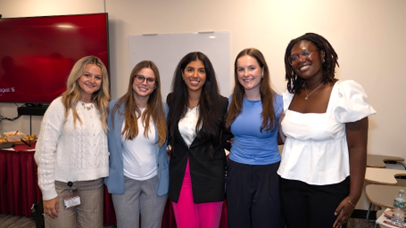 Fortunately, with the guidance of the Duncan Lab and my mentor, Dr. Jason Wasserman, I managed to turn things around. Dr. Wasserman’s support was a game changer; he not only helped me navigate the project’s new direction but also made time to assist me with all of my presentation anxieties. Thanks to his and the lab's unwavering support, I was able to shift gears and create a doxycycline-induced model system to investigate MRCKa’s role in cancer. Presenting this new project on presentation day felt like a victory lap after all the hard work. It was such a thrilling experience to see the results of our summer hustle and to celebrate the accomplishments of my lab mates and me. Seeing everyone's enthusiasm and hearing about their amazing presentations made all the challenges worth it.
Fortunately, with the guidance of the Duncan Lab and my mentor, Dr. Jason Wasserman, I managed to turn things around. Dr. Wasserman’s support was a game changer; he not only helped me navigate the project’s new direction but also made time to assist me with all of my presentation anxieties. Thanks to his and the lab's unwavering support, I was able to shift gears and create a doxycycline-induced model system to investigate MRCKa’s role in cancer. Presenting this new project on presentation day felt like a victory lap after all the hard work. It was such a thrilling experience to see the results of our summer hustle and to celebrate the accomplishments of my lab mates and me. Seeing everyone's enthusiasm and hearing about their amazing presentations made all the challenges worth it.
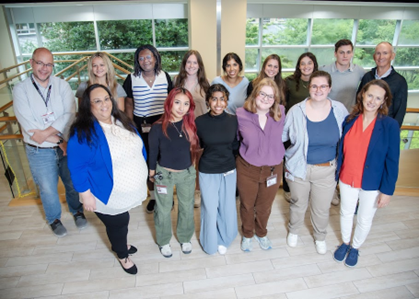 The Empower program was like a golden ticket into the world of medicine for me. It opened doors I didn’t even know existed and introduced me to a variety of career paths I hadn’t considered before. From MD/PhD programs to specialties like urology and nutrition, and even the financial aspects of healthcare, I got a full spectrum of what the medical field has to offer. Meeting such a diverse group of professionals was eye-opening and inspiring. I’m so grateful for the incredible people I’ve met, the knowledge I've gained, and the connections I've made. These experiences have not only enriched my understanding but also ignited a deeper passion for medicine. As I look forward to the next chapter, I’m excited about the future and the opportunities that lie ahead, knowing that I have a strong network of support to back me up.
The Empower program was like a golden ticket into the world of medicine for me. It opened doors I didn’t even know existed and introduced me to a variety of career paths I hadn’t considered before. From MD/PhD programs to specialties like urology and nutrition, and even the financial aspects of healthcare, I got a full spectrum of what the medical field has to offer. Meeting such a diverse group of professionals was eye-opening and inspiring. I’m so grateful for the incredible people I’ve met, the knowledge I've gained, and the connections I've made. These experiences have not only enriched my understanding but also ignited a deeper passion for medicine. As I look forward to the next chapter, I’m excited about the future and the opportunities that lie ahead, knowing that I have a strong network of support to back me up.